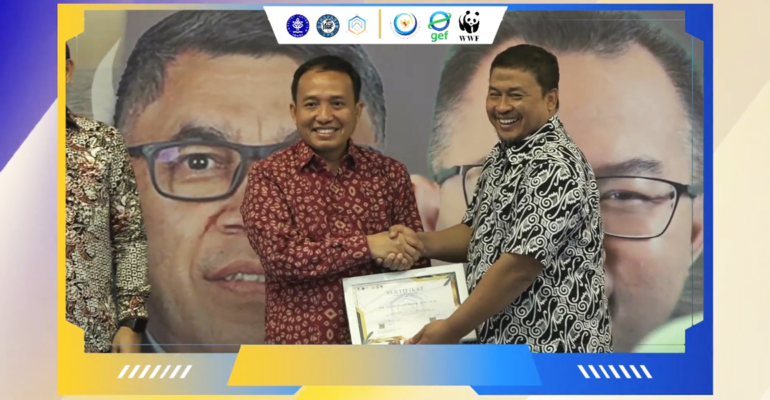The Peak Event of Nautica Fest Discusses the Urgency of Measured Governance of Capture Fisheries

The Department of Fisheries Resource Utilization (PSP), Faculty of Fisheries and Marine Sciences (FPIK) at IPB University, organized a talk show on the governance of capture fisheries. This talk show marked the culmination of Nautica Fest, an annual flagship program by the Student Association of PSP (Himafarin) at IPB University, held in a hybrid format at Hotel Pajajaran in Bogor.
Dr I Nyoman Radiarta, Chairman of the Counseling and Human Resources Development Agency (BPPSDM) at the Ministry of Maritime Affairs and Fisheries (KKP) of the Republic of Indonesia, in his opening remarks stated that the implementation of measured governance policies for capture fisheries is carried out through integrated monitoring and supervision in the field. He emphasized the need for cooperation from all parties, including universities. According to him, these policies are the government’s support for the implementation of a blue economy policy to ensure the sustainability of marine resources.
“The implementation of the blue economy policy must be supported by good maritime governance, including regulations and resource balance through this measured governance of capture fisheries policy. Synergistic and harmonious partnerships are needed between the government, academia, and stakeholders to ensure the health of Indonesia’s fisheries. Therefore, I hope that the collaboration between KKP and FPIK at IPB University will continue and strengthen,” he continued.
Prof Fredinan Yulianda, Dean of FPIK at IPB University, also emphasized that the governance of capture fisheries requires appropriate steps and policies, as many depend on the fisheries sector. “We hope that this event can serve as a platform for discussion and broaden insights into the management of fisheries resources. Thus, we can explore better management concepts,” said Prof Fredinan.
Director General of Capture Fisheries at KKP, Dr Agus Suherman, also expressed hope that universities, especially graduates of FPIK at IPB University, would join KKP in supporting the implementation of measured governance policies for capture fisheries. “The success of the implementation of these policies is crucial because it can address three issues in capture fisheries, including sustainability, welfare, fairness, and even development,” he concluded.
Prof Tri Wiji Nurani, a professor at IPB University, reiterated the importance of stakeholder synergy in the governance of capture fisheries. Stakeholders in the fisheries sector include fishermen, commercial fishing operators, central and regional governments, supply and service industries, local communities, fisheries institutions, and community development organizations. All these stakeholders need to implement synergy to achieve optimal fisheries management.
“The support from universities and academics stakeholder will further improve the policies to be formulated. If all elements involved perform their tasks well, sustainable and equitable fisheries management will be created, with a focus on environmental aspects that will ultimately contribute to the nation’s income,” she concluded. (IAAS/DSR)



